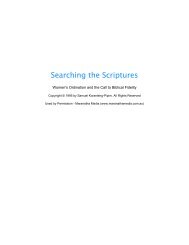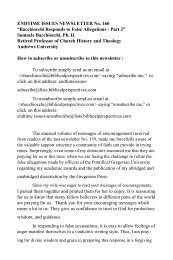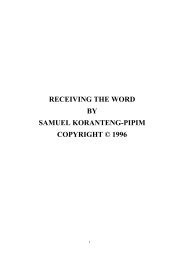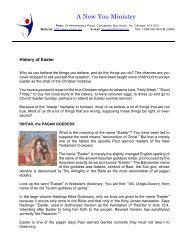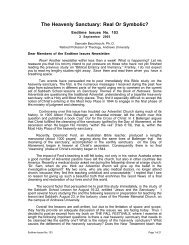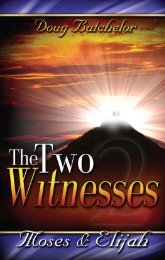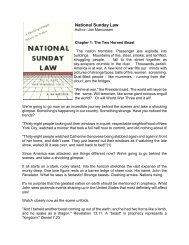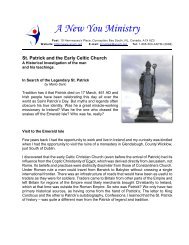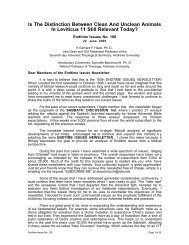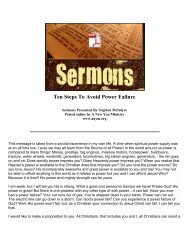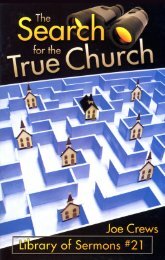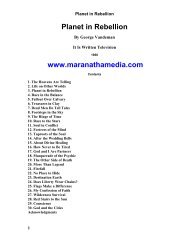Bible Readings for the Home Circleâ1914 - A New You Ministry
Bible Readings for the Home Circleâ1914 - A New You Ministry
Bible Readings for the Home Circleâ1914 - A New You Ministry
Create successful ePaper yourself
Turn your PDF publications into a flip-book with our unique Google optimized e-Paper software.
BIBLE READINGS<br />
THE AUTHOR OF LIBERTY<br />
{471<br />
471}<br />
1. HOW is <strong>the</strong> bondage of Israel in Egypt described<br />
“And <strong>the</strong> children of Israel sighed by reason of <strong>the</strong> bondage, and <strong>the</strong>y<br />
cried, and <strong>the</strong>ir cry came up unto God by reason of <strong>the</strong> bondage.” Ex.<br />
2:23. Compare with James 5:14.<br />
2. Who heard <strong>the</strong>ir groaning<br />
“God heard <strong>the</strong>ir groaning, and God remembered His covenant with<br />
Abraham, with Isaac, and with Jacob.” Verse 24.<br />
3. What did God say to Moses<br />
“Now <strong>the</strong>re<strong>for</strong>e, behold, <strong>the</strong> cry of <strong>the</strong> children of Israel is come unto Me:<br />
and I have also seen <strong>the</strong> oppression wherewith <strong>the</strong> Egyptians oppress <strong>the</strong>m.<br />
Come now <strong>the</strong>re<strong>for</strong>e, and I will send <strong>the</strong>e unto Pharaoh, that thou mayest<br />
bring <strong>for</strong>th My people <strong>the</strong> children of Israel out of Egypt.” Ex. 3:9, 10.<br />
4. In giving Israel His law, how did God describe Himself<br />
“I am <strong>the</strong> Lord thy God, which have brought <strong>the</strong>e out of <strong>the</strong> land of<br />
Egypt, out of <strong>the</strong> house of bondage.” Ex. 20:2.<br />
5. What provision did God make against slavery and oppression in<br />
Israel<br />
“And if thy bro<strong>the</strong>r, an Hebrew man, or an Hebrew woman, {472<br />
472}<br />
be sold unto <strong>the</strong>e, and serve <strong>the</strong>e six years; <strong>the</strong>n in <strong>the</strong> seventh year thou<br />
shalt let him go free from <strong>the</strong>e. And when thou sendest him out free from<br />
<strong>the</strong>e, thou shalt not let him go away empty: thou shalt furnish him liberally<br />
out of thy flock, and out of thy floor, and out of thy wine-press: of that<br />
wherewith <strong>the</strong> Lord thy God hath blessed <strong>the</strong>e thou shalt give unto him.<br />
And thou shalt remember that thou wast a bondman in <strong>the</strong> land of Egypt,<br />
and <strong>the</strong> Lord thy God redeemed <strong>the</strong>e: <strong>the</strong>re<strong>for</strong>e I command <strong>the</strong>e this thing<br />
today.” Deut. 15:12–15. “Thou shalt nei<strong>the</strong>r vex a stranger, nor oppress<br />
him: <strong>for</strong> ye were strangers in <strong>the</strong> land of Egypt.” Ex. 22:21. See 2 Cor. 1:3,<br />
4.<br />
6. What was one reason assigned why Israel should keep <strong>the</strong> Sabbath<br />
“And remember that thou wast a servant in <strong>the</strong> land of Egypt, and that<br />
<strong>the</strong> Lord thy God brought <strong>the</strong>e out <strong>the</strong>nce through a mighty hand and by a<br />
stretched-out arm: <strong>the</strong>re<strong>for</strong>e <strong>the</strong> Lord thy God commanded <strong>the</strong>e to keep <strong>the</strong><br />
Sabbath day.” Deut. 5:15.<br />
THE AUTHOR OF LIBERTY<br />
NOTE.— This would suggest <strong>the</strong> idea that in <strong>the</strong>ir servitude and oppression<br />
in Egypt <strong>the</strong>y had had difficulty regarding <strong>the</strong> observance of<br />
<strong>the</strong> Sabbath, which is a fact. From <strong>the</strong> accusation brought against<br />
Moses and Aaron by Pharaoh, as recorded in Ex. 5:5,—“Ye make <strong>the</strong>m<br />
rest [Heb., Shabbath] from <strong>the</strong>ir burdens,”—it is plain that <strong>the</strong> Sabbath<br />
had been denied <strong>the</strong>m, that <strong>the</strong>y had been required to work on <strong>the</strong><br />
Sabbath, and that Moses and Aaron were teaching <strong>the</strong>m to keep it.<br />
Where individual rights and religious liberty are recognized, Sabbath<br />
observance is nei<strong>the</strong>r denied nor required by civil law.<br />
7. What proclamation was to be made throughout <strong>the</strong> land of Israel<br />
every fifty years<br />
“And ye shall hallow <strong>the</strong> fiftieth year, and proclaim liberty throughout<br />
all <strong>the</strong> land unto all <strong>the</strong> inhabitants <strong>the</strong>reof: it shall be a jubilee unto you;<br />
and ye shall return every man unto his possession, and ye shall return<br />
every man unto his family.” Lev. 25:10.<br />
8. Because Israel failed to do this, became oppressive, and disregarded<br />
and misused <strong>the</strong> Sabbath, what did God do<br />
“There<strong>for</strong>e thus saith <strong>the</strong> Lord; Ye have not harkened unto Me, in proclaiming<br />
liberty, every one to his bro<strong>the</strong>r, and every man to his neighbor:<br />
behold, I proclaim a liberty <strong>for</strong> you, saith <strong>the</strong> Lord, to <strong>the</strong> sword, to <strong>the</strong> pestilence,<br />
and to <strong>the</strong> famine; and I will make you to be removed into all <strong>the</strong><br />
kingdoms of <strong>the</strong> earth.” Jer. 34:17. See also Jer. 17:24–27; 2 Chron. 36:19–21.<br />
9. What fault did God find with <strong>the</strong> way in which Israel came to<br />
celebrate her fasts and seasons of worship<br />
“Behold, in <strong>the</strong> day of your fast ye find pleasure, and exact {473<br />
473} all<br />
your labors. Behold, ye fast <strong>for</strong> strife and debate, and to smite with <strong>the</strong> fist<br />
of wickedness.” Isa. 58:3, 4.<br />
10. What does God set <strong>for</strong>th as <strong>the</strong> acceptable fast to Him<br />
“Is not this <strong>the</strong> fast that I have chosen to loose <strong>the</strong> bands of wickedness,<br />
to undo <strong>the</strong> heavy burdens, and to let <strong>the</strong> oppressed go free, and that ye<br />
break every yoke Is it not to deal thy bread to <strong>the</strong> hungry, and that thou<br />
bring <strong>the</strong> poor that are cast out to thy house when thou seest <strong>the</strong> naked, that<br />
thou cover him; and that thou hide not thyself from thine own flesh” Verses<br />
6, 7.<br />
NOTE.— All this shows that God loves liberty, and hates bondage and<br />
oppression.<br />
11. What was Christ’s mission to this world<br />
“The Spirit of <strong>the</strong> Lord is upon Me, because He hath anointed Me to<br />
preach <strong>the</strong> gospel to <strong>the</strong> poor; He hath sent Me to heal <strong>the</strong> broken-hearted,<br />
to preach deliverance to <strong>the</strong> captives, and recovering of sight to <strong>the</strong> blind,<br />
to set at liberty <strong>the</strong>m that are bruised.” Luke 4:18.<br />
NOTE.— The Gospels show that a large part of Christ’s time even on




